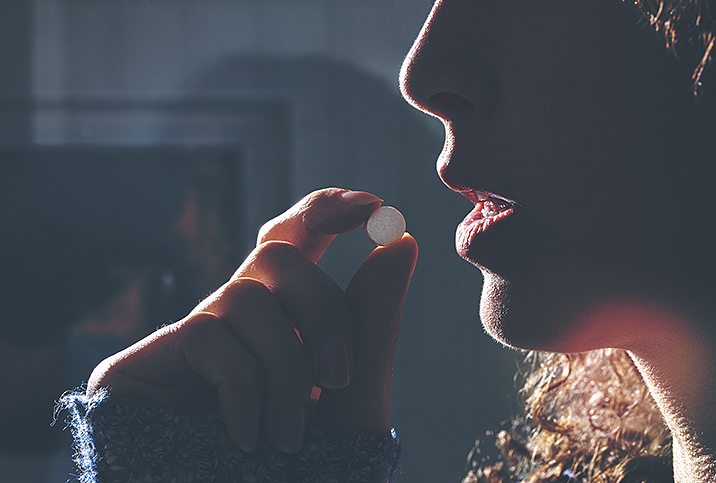Antidepressants and Your Libido

Antidepressants are an effective way to manage mental health issues such as clinical depression, panic attacks and anxiety. The prescribed pills, which vary by dosage and need, are especially useful when taken in tandem with regular therapy appointments or proven stress-relief practices. However, despite being largely beneficial, antidepressants also have several side effects.
One of the most common side effects is a decrease in libido. While there’s no one-size-fits-all reason why this may occur—or a single perfect solution—it’s normal, regardless of your gender, partner or sexual preferences.
The many effects of serotonin
Selective serotonin reuptake inhibitors (SSRIs) are the most widely used class of antidepressants. SSRIs, such as escitalopram (Lexapro), fluoxetine (Prozac) and sertraline (Zoloft), treat mental illnesses like depression by gradually increasing the levels of serotonin in your brain. But doctors have hypothesized that the increase in serotonin—known as one of the “happy hormones”—can affect other hormones in the body, such as testosterone and dopamine, possibly leading to sexual dysfunction.
Lost libido isn’t the only sexual concern, though. Patients have also found that they may struggle to ejaculate, achieve orgasm or have an erection. Some women on SSRIs report vaginal dryness, especially when they’re taking higher doses of the medicine.
However, SSRIs are just one class of antidepressants. Serotonin-norepinephrine reuptake inhibitors (SNRIs) and atypical antidepressants are very commonly used today and are associated with less sexual dysfunction than SSRIs.
Resolve side effects
So, how can you cope with some of the side effects of antidepressants? Communicating with your sexual partner, connecting with your body and practicing mindfulness exercises are all excellent options.
1. Talk about it
Whether you’re with a longtime companion or a casual fling, communication is a great way to ease nerves for both parties. It can feel intimidating at first, but relaying the truth about your condition will relieve any potential awkwardness or tension. If you can’t find the right words, try these: “Just to let you know, I’ve been struggling to get turned on lately. It has nothing to do with you. It’s a side effect of my medication.” Fortunately, the side effects of SSRIs may improve; doctors typically monitor them for four to six weeks, and if there is no improvement, they may change to another medication within the SSRI class.
2. Get familiar with what gets you excited
It’s easy to internalize what you should enjoy sexually, given the abundance of messages from various media, whether they’re in songs, movies, TV shows or pornography. But have you actually spent the time to explore your body and what affects it?
Quite frankly, there’s no better time to do that than when you’re struggling to attain an erection or reach an orgasm. Take a night to yourself, light a few candles, take a bath or simply lie where you’re most comfortable at home. Do your best to stop thinking so hard, and especially stop focusing on the end goal. You can touch yourself or peruse erotica, but no matter what activity strikes your fancy, take note of what feels good. If it works once, it’ll work again.
3. Practice mindfulness
Meditation is not just a good stress-reliever for every day, it’s also been found to increase sexual arousal. In a research study at Brown University, a group of 30 women who took a three-month meditation course were able to tune in to their arousal faster, as well as pay better attention and experience less anxiety, than women in the control group.
Of course, this all comes as no surprise to writer and editor Jeremy Adam Smith, of mindful.org and Greater Good magazine. According to Smith, “mindful sex involves being able to observe and describe what’s happening inside your body and mind without sorting experiences into ‘good’ or ‘bad’ or trying to change your feelings.”
In other words, turn off that autopilot function and use your five senses to create more meaningful experiences.
Good company
Above all, the most important detail to remember is that you’re not alone. More than 13 percent of American adults currently rely on antidepressants, and many more have past experience taking them.
SSRIs are better understood now than they’ve ever been, making it easier and more fruitful to talk to your doctor about them. Many other options, such as different medications, devices and therapies, are also available to help you feel your best in bed.
Decreased libido may be a side effect of SSRIs or a symptom of depression. Take time to reflect on your symptoms and talk to your doctor to make sure the potential issue of depression is addressed and treated.
For many people, supplements may help address a diminished desire for sexual activity. Giddy Health Libido Boost vitamins can help you maintain a normal, healthy sex life. These supplements use ethically sourced formulations and dosages backed by science and research, including Panax Ginseng and Ashwagandha, which can enhance sexual arousal and satisfaction.
Here’s another way to tackle this problem: If your body is forcing you to slow sex down, take this ideal opportunity to try new actions and get to know more about your unique sexuality.















